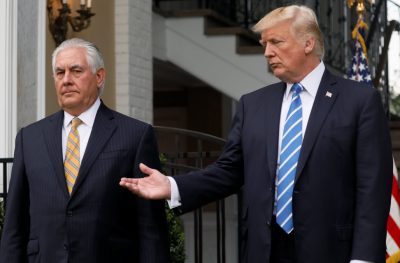Who to Believe on Washington’s Korea Policy, Tillerson or Trump?

President Trump has often said that his foreign policy objective was to keep his enemies guessing. If that’s the goal, you could say that he’s doing a good job. The problem is who does he think his enemies are, because the American people are often left guessing as well.
US policy toward North Korea last week is a good example of how the Trump Administration is wittingly or unwittingly sowing confusion among friend and foe alike. In what looked like a breakthrough, Secretary of State Rex Tillerson announced last Tuesday that the US would be willing to sit down and talk with North Korea “without preconditions.” Previously the US had demanded that North Korea agree to end its nuclear weapons and missile programs before Washington was willing to sit down to formal talks.
The State Department shift toward actual diplomacy with North Korea was quickly quashed, however, when the White House announced that its position on North Korea had not changed. It seemed that the State Department and White House were each pursuing different foreign policies on the Korea issue.
The White House even appeared to belittle Tillerson’s attempt at diplomacy, releasing a statement on Wednesday that talks with North Korea would be “pointless.” No wonder speculation persists that Tillerson is on his way out as Secretary of State.
Then on Friday Secretary Tillerson seemed to do a u-turn on his own policy, announcing at a UN Security Council meeting that a “sustained cessation of North Korea’s threatening behavior” must precede any negotiations with the US. “North Korea must earn its way back to the table,” he said. So, after just three days the offer of unconditional talks with North Korea had been put on and then removed from the table.
There is more than a little hypocrisy in US demands that North Korea cease its “threatening behavior.” Just this month the US and South Korea launched yet another joint military exercise targeting North Korea. Some 12,000 military personnel and 230 aircraft – including stealth fighters – participated in the massive war games. Does anyone think this is not meant to be threatening to North Korea?
It is a shame that the hawks in the Administration continue to dominate. It seems pretty reasonable to open talks with North Korea after a period of “good faith” gestures between Washington and Pyongyang. Why not agree on no US/South Korean joint military exercises for six months in exchange for no North Korean missile launches for the same period and then agree to a meeting on neutral ground? How could it possibly hurt, particularly considering the alternative?
The hawks continue to talk up a US strike against North Korea. Senator Lindsey Graham seemed pleased when he announced that there was a 70 percent chance that the US would attack North Korea if it detonated another nuclear weapon. Does he realize how many people will die? Does he care?
Defense Secretary James Mattis seems skeptical about neocon hysteria, declaring that the North Korean missile program does not pose a “capable threat” to the United States. With that in mind, we can only hope that President Trump will encourage Tillerson to do another about-face and return to the idea of talks without pre-condition. Strategic ambiguity is one thing, sending constantly mixed signals when nuclear war looms is something else.
Featured image is from AOL.com.

